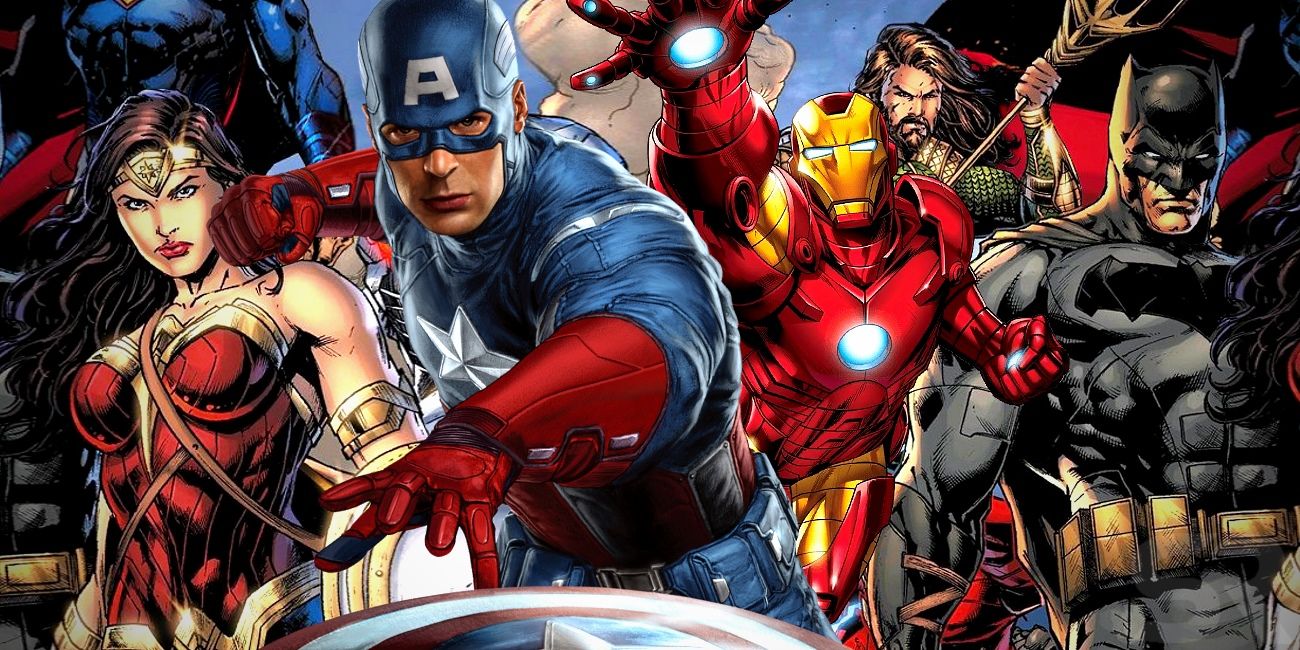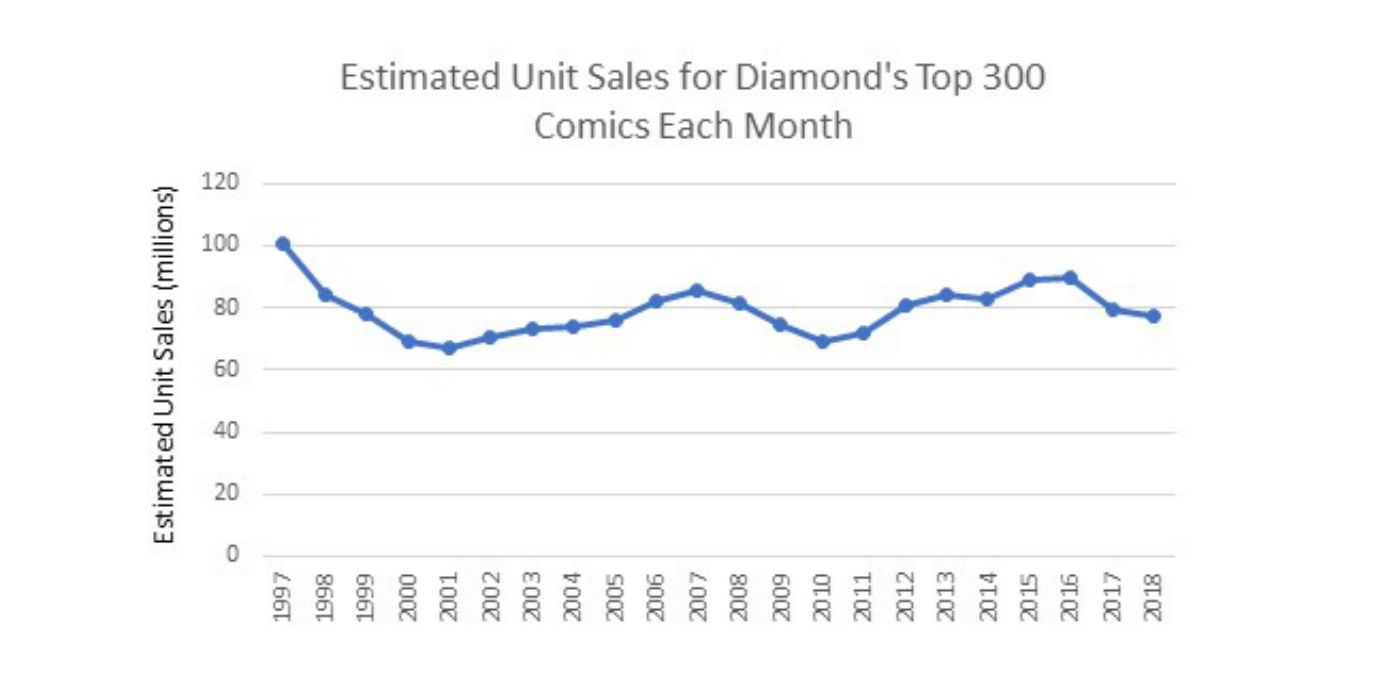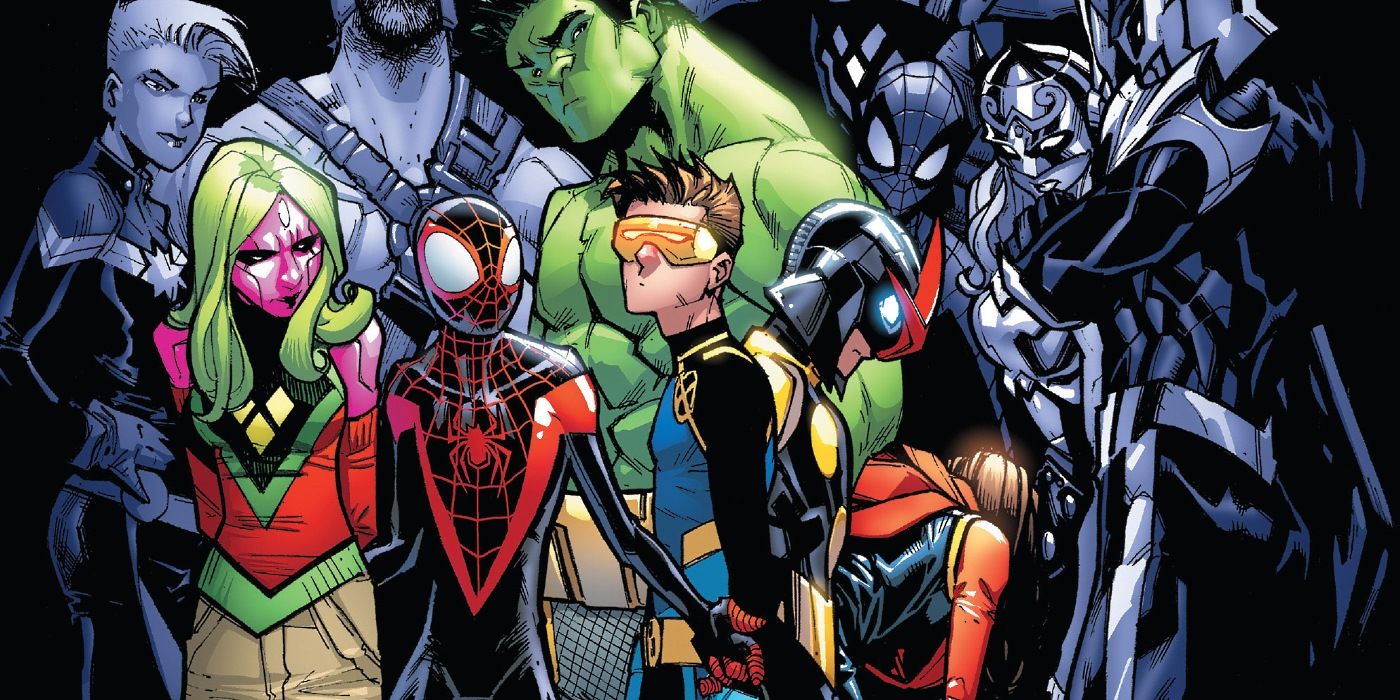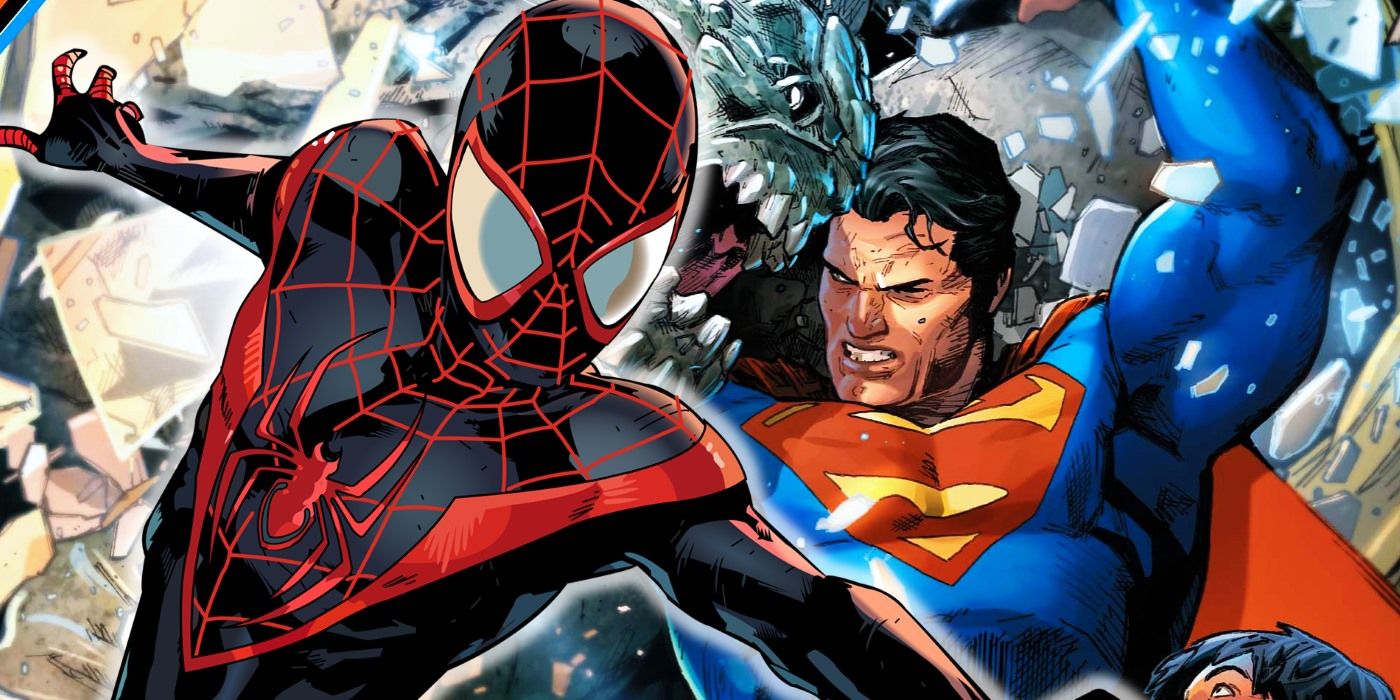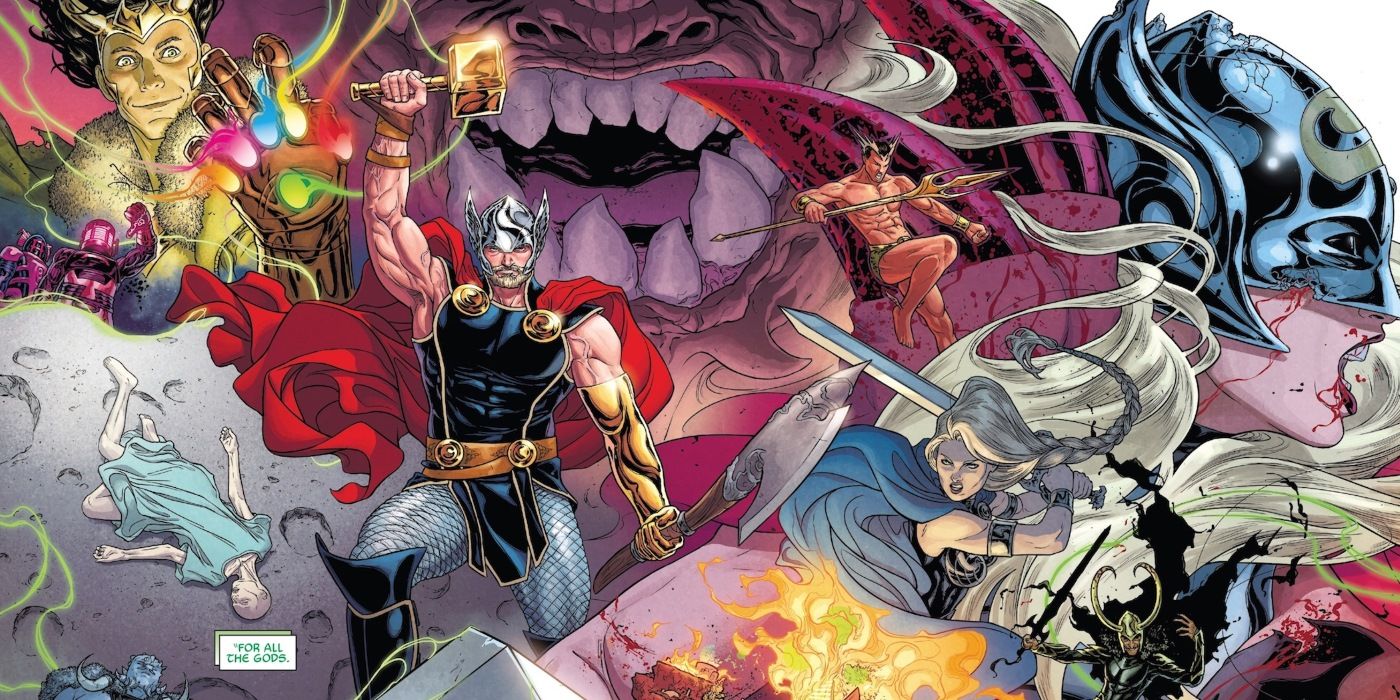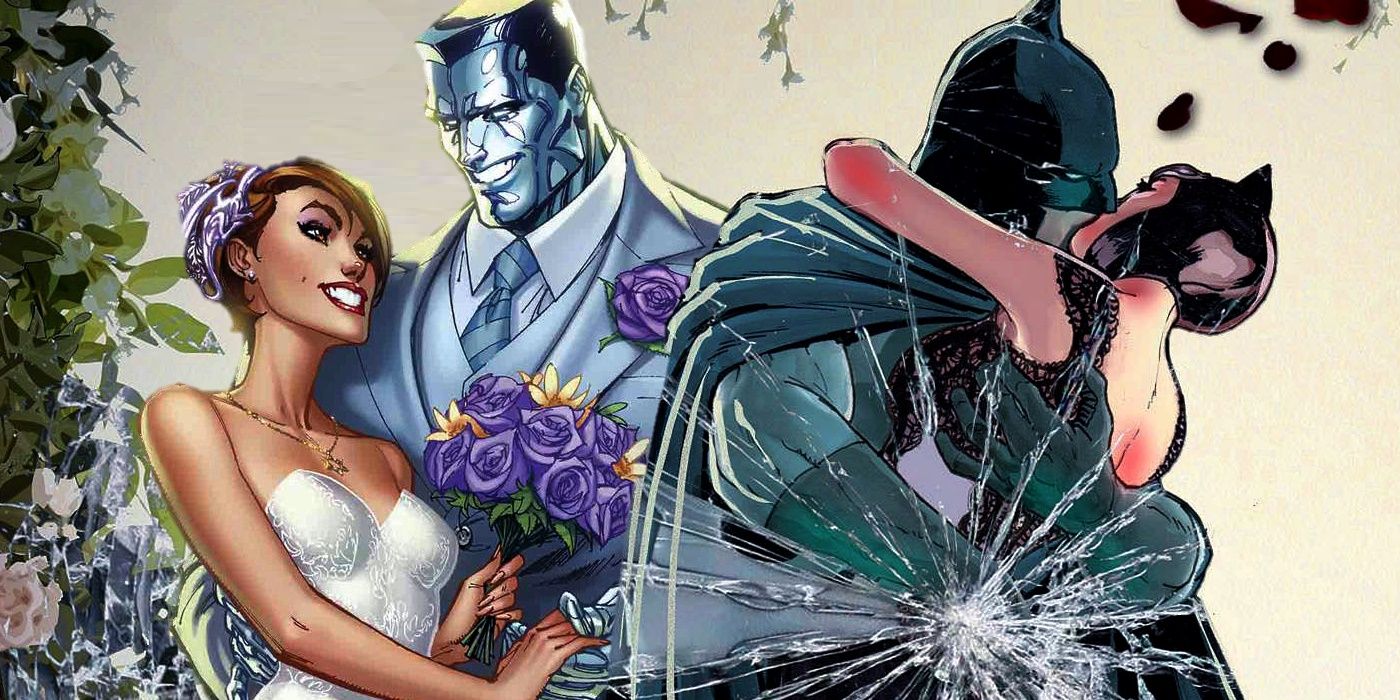If you read the headlines, you might firmly believe that the comic book industry is in a state of total, imminent crisis. Back in 2017, a "Meet the Publishers" panel at San Diego Comic-Con kicked off a storm when the heads of DC Comics states an intention to "stop the collapse of the comic book industry." DC eventually insisted it was something of a misquote, but the sentiment created a very real sense that all is not well in the comic book world. At a time when comic book adaptations are bigger than ever... public interest in the actual comics seems to be waning.
More recently, veteran retailer Brian Hibbs presented a barnstorming "State of the Industry" address at the ComicsPRO Annual Meeting, confirming that comic book retailers do indeed seem to be in decline. By his estimate, up to 10% of stores in the United States have closed over the last year (the entire speech is available on industry website ICv2). Needless to say, Hibbs' warnings of watching the entire industry "crumble away" have given rise to a flurry of new speculation online, questioning the health of the Direct Market complete with exaggerated claims that DC Comics is about to be shut down, and Disney is killing Marvel Comics, too. Suffice to say, these rumors are completely unfounded.
Related: Marvel Beats DC as 2018's Top Comic Publisher
But just how bad are things in the comic book industry? Is this all just a storm in a teacup, or is it really a matter of Heroes in Crisis? It's not an easy question to grasp for casual fans, so let's take a look at the evidence, and then examine just what publishers are doing to correct the problems.
Are Comic Book Sales Declining?
The comic book industry was at its most recent peak in the 1990s, before a major slump - which almost led to Marvel Comics going bankrupt - saw sales drop from levels that they may never equal again. Looking at Diamond's sales estimates, at first glance it seems that the comic book industry has stabilized (see chart visible above). In reality, though, the data hides a lot of problems. The main issue is the retail model of comics themselves, which involves retailers purchasing comics from Diamond Distribution, then selling them on to customers. Diamond's figures only cover retailer purchases in the United States, and that's a very limited dataset.
If every one of a retailer's purchases sells, then they're fine. The reality is very different. Too many books aren't selling, and that's due to a variety of causes: constant relaunches, cycles of miniseries and first-issues, where retailers struggle to estimate just how many copies they need to actually have in stock in the first place. Worse still, industry figures have suggested that a solid 90% of stock that comes off the shelves has zero value as an 'archived' back issue. That's according to Phil Boyle of Coliseum of Comics, who spoke firsthand in an editorial for ICv2 of his own losses on issues going unsold in the first weeks:in which he gave a sense of just how bad things are getting.
"No one is looking for a 3-issue mini-series 6 months removed unless it features a new character and there’s a rumor circulating about his/her inclusion in a movie that was possibly green-lit. Between February and October we had, at cost, nearly $100,000 in books that were taken off the stands. 60% were instantly unsellable. 30% will languish if they’re still here in 3 months."
The result is that comic book retailers are being forced to shut down. The celebrated Mile High Comics in Glendale, Colorado made headline with its closing in January of 2019, after nearly 29 years in business as one of the largest comic shops in the country. Manager Charles Rozanski posted a heartfelt Facebook post in which he explained the closing in clear, but concerning terms: "I fervently believe that the economics of comics publishing simply no longer allow smallish neighborhood comics shops to be successful."
The Direct Market is Part of the Problem
While the bulk of comic book sales are indeed believed to be through this so-called Direct Market, it's important to note that Diamond's figures don't include other crucial sales channels. Digital sales, meanwhile, are a complete unknown. There have been throwaway comments over the years that online sales of some books, particularly those of younger heroes, actually exceed physical copies (particularly Marvel's Legacy Heroes like Spider-Gwen and Ms. Marvel), but of course it's impossible to evaluate. Meanwhile, there are also no details for Marvel's sales deal with Scholastic, which sells books like Unbeatable Squirrel Girl.
All this seems rather strange, given comic book adaptations have never been more popular, and superhero brands have pervaded popular culture to the degree that an Aquaman film can gross over $1 billion worldwide. That suggests the problem is to do with the entire retail model. So with that established, let's dive into exactly how the Direct Market works.
Page 2 of 2: Why The Direct Comics Market Needs to Change
The Problem With Buying Comic Books
In order to purchase a comic, a prospective reader has to go out of their way to find a local comic book retailer that happens to stock the book they're interested in. This kind of approach poses significant barriers to casual readers, who are thinking of dipping their toe into comics. What's more, pricing doesn't help; most comics sell for between $3.99 and $5.99 for a single issue. Assuming this potential reader actually goes to a comic book shop, they'll find themselves bombarded with options, and frankly able to afford only one or two of them.
To use an example, if a new reader wants to pick up a Spider-Man comic, which one should they go for? Amazing Spider-Man (which publishes bi-weekly, with three issues due to come out in March 2019 as a result), Spider-Man: Life Story, Marvel's Spider-Man: City At War, the Spider-Man: Far From Home Prelude, or even Spider-Man/Deadpool? And that's not even counting additional webhead-related titles, such as Venom, Spider-Gwen: Ghost Spider, Miles Morales: Spider-Man, or Superior Spider-Man.
Nothing about this experience is attractive to a brand new comic book reader. And the sheer number of comics published in a month isn't just an issue for new readers; in an interview with ICv2 at San Diego Comic-Con 2018, DC Publisher Dan DiDio suggested the entire market is in trouble. "My fear is that there's probably an over‑saturation of product," he explained. "If you're looking at the numbers, you're looking at 400 new periodicals a month." In his view, the model clearly isn't sustainable.
Related: 2018 Belonged To DC Comics, Not Marvel
There is, however, one aspect of the comic book market that's experiencing something of a boom of late. Over the past five years, the North American graphic novel market has welcomed a wave of new readers and grown from about $805 million in sales in 2012 to more than $1 billion in 2017. But these sales aren't happening at traditional comic book retailers; they're happening at everyday bookshops such as Barnes & Noble. And even that wasn't sustained in 2018, with bookshops seeing reduced sales across the board due to a slowing economy. Regardless, the fact that there's such a difference in trend between the Direct Market and the bookshops is quite striking; again, it suggests that the problem is with the retail model itself.
Are DC And Marvel Taking The Right Approach?
The problems in the Direct Market are, realistically, being worsened by the publishers; they're taking short-term strategies that are designed to give a brief boost in monthly sales, at the expense of building an actual ongoing relationship with the readers. Sadly, retailers identify Marvel Comics as a particular problem. Just as in the '90s, many of Marvel's sales are driven by variant covers, often at an exaggerated price. Brian Hibbs gave an excellent example, in the upcoming "War of the Realms" event.
"'War of the Realms' had seventeen different covers on the first issue at initial solicitation, and they’ve also added another eight more at FOC (after, of course, we’ve presold our sets and such) – all of this on a SIX DOLLAR comic. A customer who actually wanted all 25 copies of that one single release would be asked to spend nearly $150. On a single issue of a single comic."
Often, variant orders come with strings attached; so, for example, a retailer will only be able to order limited-edition, higher-demand variants if they purchase over a certain number of the standard edition. The retailer can be reasonably confident these limited-edition comics will be in demand, but rarely has any way to know for sure how well the normal version is going to perform, so they're essentially forced to gamble. Publishers profit from the gamble, but if those books don't all sell, then they're just taking up shelf-space in the shops that could have been used for other titles.
The challenge facing all comic book publishers is just how to respond to the current situation. DC, for example, has already chosen to reduce their line by somewhere between 10 and 15 percent in order to lessen the amount of content on the shelves at any one time; they're also looking closely at reducing the number of collected editions for the same reason, and considering adding material to print versions that wouldn't be available in a digital format. Both Marvel and DC are experimenting with different distribution models that avoid the Direct Market, with DC's Black Label initiative and Marvel's Scholastic deal.
In truth, the comic book industry isn't really in a crisis; it's more that it's undergoing a period of dramatic disruption, with both the publishers and the retailers struggling to work out how best to operate in the modern world. That doesn't mean the comic book publishers are in any danger of going bust; reports that Disney and Warner Bros. are considering shutting down Marvel and DC Comics are complete nonsense, with no supporting evidence behind them at all. Rather, it means that they're going to need to experiment, and deviate from the traditional Direct Market model. DC Comics feel to be the trailblazer right now, but even they haven't quite cracked it. Whoever works out the right approach first will surely become the market leader.
But there will inevitably be real consequences for comic book shops. If the publishers find a new model that works more effectively in the present, it's likely to become their main sales channel going forward. This will increase the pressure on retailers, who again will need to either adapt... or close up shop. What will the future hold if and when that happens? Well, readers will have to wait to cross that bridge.

